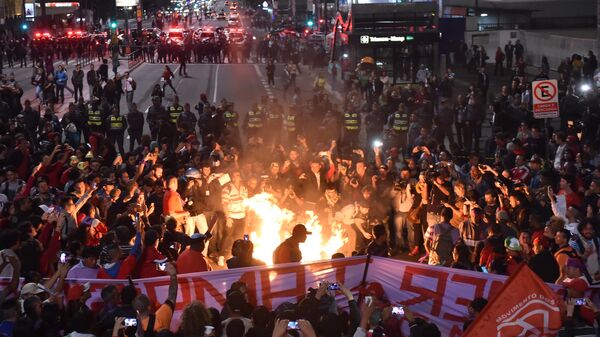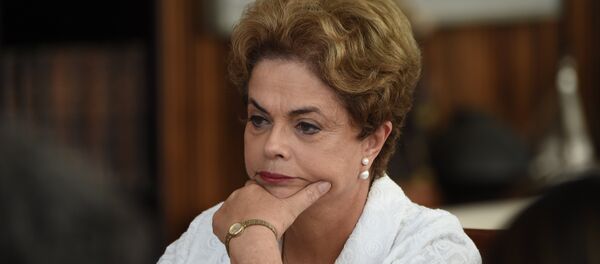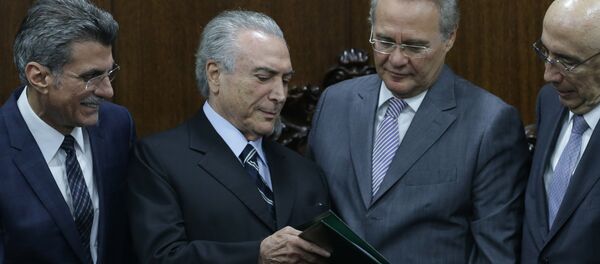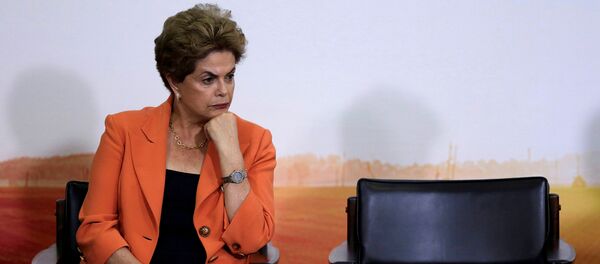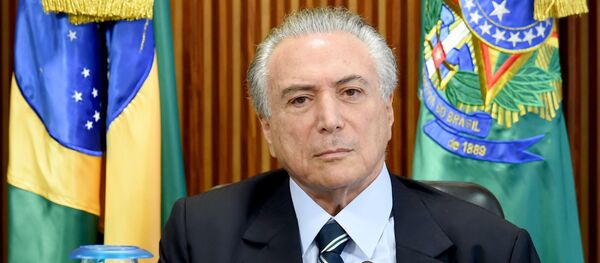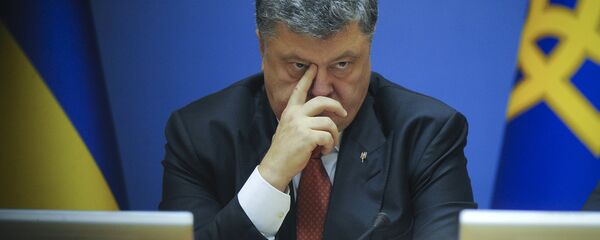Temer's interim government has gotten off to a rocky start and is already facing a severe political crisis, with Rousseff allies slamming the two-week old government for its lack of legitimacy and its plans to cause "enormous damage" to the country's social safety net.
Speaking to Sputnik Brazil, Senator Gleisi Hoffmann called the new government and its actions "a disaster, and one which we had anticipated."
"We had warned that the conditions for the vice president to form a government did not exist – that he does not have the program or the moral [authority] which had previously been demanded of President Dilma. From what we've seen of the interim government's actions over the last two weeks, he [Temer] is not prepared to govern Brazil."
"And today," the senator added, "the interim president proposed changes to the budget which would undermine the rights of workers and cause harm to social programs, with a complete lack of concern for the fate of the majority of the Brazilian people, most of whom are poor."
Indicating that she had spoken to Dilma on Monday, Hoffman noted that the president said that the current political crisis is a confirmation of what she had anticipated. Dilma, Hoffman said, emphasized "that this process of impeachment, which we have always referred to a coup d'état, was not about her dismissal over budget manipulations, but about her desire to change the program chosen by the Brazilian people during the 2014 elections."
"The president is upset about everything that has happened, but is also calm and will await our discussions within the Impeachment Committee in the Senate, and how we will defend her, and defend our democracy," the senator concluded.
Maduro isn't alone in his assessment, with independent Latin American, US and European media also saying that they smell a coup. Russian analysts are no different. In an article for the independent online news and analysis portal PolitRussia, journalist Ivan Shatov explained that a coup is definitely underway, and that it will have global implications.
"When two-thirds of the lawmakers of the lower house of the Brazilian National Congress voted to impeach the country's president a month ago, it became apparent that we are witnessing another regime change operation," Shatov wrote.
"President Dilma, whose main sin has been to adopt an independent foreign policy and to cooperate with Russia in the frameworks of the BRICS, called the situation in the country an anti-government putsch, organized from abroad," he added.
"The instrument used to create a split in society is well known among other countries which have faced color revolutions, and revolves around corruption charges. Rousseff was charged with manipulating government accounts."
Meanwhile, "the situation in the country has changed at lightning speed. The voting for impeachment was accompanied by a confrontation by both blocs in parliament; after that, the streets were filled with supporters and opponents of the president. It seemed that it would only be a matter of time before the go-ahead was given for the final assault."
In other words, Shatov noted, Temer, whose official resume includes the posts of vice president, acting president and chairman of the Brazilian Democratic Movement Party, can also include 'US intelligence informant' to his record of employment.
At the same time, the journalist warned, "it's impossible not to mention that the situation in Brazil today is painfully reminiscent to that at the start of the coup in Ukraine, which later grew into a civil war. Despite the fact that the situation for Washington and the fifth column in Brazil looks more promising, a change in the country's political course will not be easy. The main obstacle continues to be the broad support for Dilma Rousseff from Brazilians who are unlikely to accept the fact that their legitimate president has been replaced by an American puppet. Everything is moving toward a situation where the protests of tens of thousands in support of the ousted president might escalate into serious street clashes and ignite a civil war."
Hence, in Venezuela too, "the situation is unfolding according to the Kiev scenario," the journalist wrote. "An international delegation headed by the former Spanish prime minister has come to the country to convince Maduro to give up his power and hand the country over to the Americans. In their own time, European leaders in Kiev attempted to convince Ukrainian President Viktor Yanukovych to do the same thing, but did not keep any of their agreements."
Back to Brazil. "The Brazilian economy plays an important role in the world, all the more so considering that the country is a member of the BRICS, an organization which not long ago began to pose a serious threat to the hegemony of the US dollar. It's no secret to anyone that the US has been extremely irritated by the BRICS Bank from the first days of its existence."
Washington, Shaatov recalled, "undertook many attempts to intimidate the Bank's members, such as sectoral sanctions, during the visit of the Russian delegation to Latin America in July 2014. At the G20 summit, a massive attack was organized against Russia to slow the process of creating a new financial hub. But it was last year's BRICS summit in Ufa, Russia, where the participating countries agreed on setting up an alternative to the International Monetary Fund and the World Bank, which became a turning point for the global financial system." At the time, analysts commenting on that summit suggested that the agreements reached there threatened to put an end to US domination of global finance.
Ultimately, "in the event that the BRICS countries do find alternatives to the elements of the [US-controlled global] financial system, such as US currency, US bonds and the IMF, the United States will immediately turn into a normal country, which must use its own resources to make ends meet. Naturally, Washington cannot simply allow this to happen."
"Incidentally, the six-month temporary suspension of the Brazilian president will end just in time for the US elections," Shaatov concluded.

